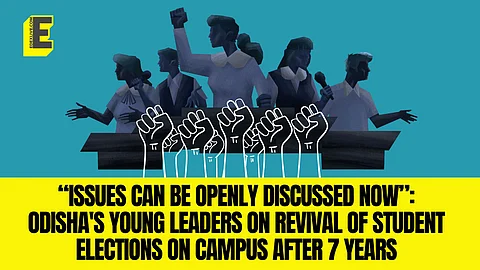

After seven years of uncertainty and repeated pleas from students, the Government of Odisha has finally responded to their long-pending requests by announcing the resumption of student union elections in colleges and universities across Odisha.
As of now, there has been no official notice about it; Chief Minister Mohan Charan Majhi’s recent announcement regarding this issue during a programme in Cuttack has been widely acknowledged both in educational and political circles.
The previous government had stopped holding student union elections due to various reasons, such as campus violence and the COVID-19 pandemic. The current Bharatiya Janata Party (BJP)-governed state had promised to resume student elections in colleges and universities in their 2024 election manifesto after coming to power.
Student union elections are an important democratic process. They offer students an opportunity to engage and experience the workings of democracy and politics at the forefront.
Many prominent leaders — including Union Minister Dharmendra Pradhan, Biju Patnaik, Member of Legislative Assembly (MLA) Byomkesh Ray, and MLA Arun Sahoo — began their political journeys through campus elections, later making significant contributions at both the state and national levels.
It has been over seven years since the last student union election, and a generation of students has grown up without firsthand knowledge of a student union or its importance.
A student named Priya Ranjan Pandab from Ravenshaw University, Cuttack, expresses his happiness that student elections will be conducted after seven years of struggle and efforts by students.
He says, “Resuming student elections will have a good effect as student leaders will closely work with other students and understand their problems better than people at the administration level. Every time we try to approach the authorities at the administration level with our problems, they ignore our requests and fail to solve our problems. Once a student union is formed and a student leader is elected by the students themselves, it will be easier to address our problems.”
“The student union election is very important as it gives authority to the students to fight for their rights; it also enhances their leadership skills,” says another student, Muskan Rai from Ravenshaw University.
“Since childhood, we have been trained to have a leader among us that could communicate student problems to the authorities, be it a school monitor or a class representative in college, and similarly, in university, a student union plays a major role in bridging the gap between the students and the administration.”
Stating an opinion on the resumption of student union elections, Professor Manoranjan Mahanty from Brahmanjharilo Mahavidyalaya College opines, “It has been seven years since any student election was held. The previous government imposed such restrictions due to campus violence, and this prolonged absence of student elections has resulted in students feeling disconnected from the decision-making process in their academic and social experiences. Yes, incidents of violence have occurred, but violence also takes place during general elections, and those are never cancelled.”
He continues to add that student union elections are a reflection of democracy in action. They provide students with invaluable opportunities to develop leadership skills by addressing real student issues.
Further explaining the importance of student union elections, Muskan points out that despite government universities ensuring education at a minimum cost, if a student from a marginalised community wanting to join in any expensive course or is not given the proper accommodation, the student will have to think twice before taking the admission or bear all the extra costs of living and pursuing their dreams.
Students choose government universities because of the affordability; if not, they would choose private universities. Such issues can be openly discussed and raised if the student union election is conducted and a student leader is elected.
Addressing the rising concerns of campus violence due to elections, Priya Ranjan comments with confidence that it will be a violence-free student election as police forces will be deployed during the process, and every student will be able to cast their vote safely.
Emphasising the measures to be taken to conduct a peaceful union election, Muskan refers, “Despite violence and other controversial events taking place at general elections, they are never cancelled; similarly, student union elections are also to be considered as a type of election where students have the right to stand for the elections and vote.”
She adds that strict rules and regulations should be maintained by the administration to conduct a peaceful election, but shutting down the election process itself is not the solution.
When asked if they would like to participate in the upcoming student elections, Priya Ranjan shares his childhood story of serving as a class monitor. Reflecting on his experience, he understands the importance of student elections and suggests that participating in student elections is a crucial part of university life as the student becomes aware of the several issues their peers face. He says he will not be able to participate in this term of elections, but given a chance to serve, he will always be ready to do so.
On the other hand, Muskan believes that she sees herself in a leadership position, and if given a chance, she would surely participate.
The government is also making efforts to commence the academic sessions for undergraduate (UG) and postgraduate (PG) courses by July 15, so that the first semester finishes before the Dussehra vacation and elections don’t cause a hindrance to students’ academics.
